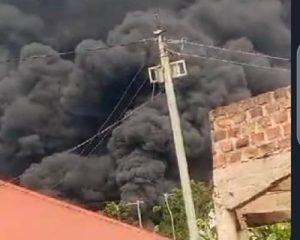
The environment has been endangered by a fuel tanker explosion at Kigogwa town, Kampala-Bombo road in Kasangati, Wakiso district, which has left damage in surrounding waters and shore biotas as petroleum consists of toxic chemicals.
Petroleum smoke is the greatest source of air and water pollution affecting the environment in totality; therefore, this fuel that burns brings pollutants that include carbon monoxide (CO), hydrogen sulfide (H2S), sulfur dioxide (SO2), and nitrogen dioxide (NOx) that are automatically released into the environment, which then contaminate air and water that are naturally consumed by living things.
When fossil fuels are burned, they release nitrogen oxide into the atmosphere, which contributes to the formation of smog-acid rain. This same rainwater is collected for human consumption.
Petroleum smoke ranks as a major source of air pollution hazards that toxicate air, such as benzene, toluene, and ethylbenzene (BTEX).
Air pollution is contamination of an indoor or outdoor environment by any chemical, physical, or biological agent that modifies the natural characteristics of the atmosphere.
Patrick Onyango, the police spokesperson, said on Tuesday, October 22, 2024, that a truck overturned after an accident and later exploded at Kigogwa town near Kampala capital, leading to a loss of over 10 lives, more so for those who tried to siphon fuel.
“At 3:00 pm today, October 22, 2024, a fuel tanker overturned and later caught fire at Kigogwa town along Kampala-Bombo Road in Kasangati, Wakiso district. Reports indicate that several lives were lost while others were injured,” he said.
Read Also: 14 Reported Dead in Fuel Tanker Explosion near Uganda’s Capital
He added that onlookers at the scene took videos and shared them online, evidencing people scooping up fuel from a truck seen lying on its side before it exploded.
In Uganda, a fuel tanker explosion killed 31 people and injured 20 at the outskirts of Kampala on June 29, 2013 after a tanker collided with a car, where victims were trying to siphon fuel from the damaged tanker.
Musa Ecweru, the Minister for Disaster and Preparedness, described the incident as an avoidable calamity, saying that it was unfortunate that some people failed to learn from their past mistakes.
“We have always told our people to stay away from trucks that contain inflammable products such as gasoline, and we thought they would learn from lessons of the past,” he said.
Harriet Nasongo, a resident at Kigogwa, noted that during and after the fuel tanker explosion, they experienced difficulty breathing from their residences because of the black smoke that covered the entire area they stayed in.
“I am not only complaining of breathing difficulty, but my plants for sale are damaged with black smoke in my garden; for sure this fuel tanker explosion has caused damage,” Nasongo said.
Uganda police continues to issue a warning to the public to desist from quick money by running to accidents involving trucks carrying products that are inflammable in order to avoid cases of death caused by blasts or fire explosions.














